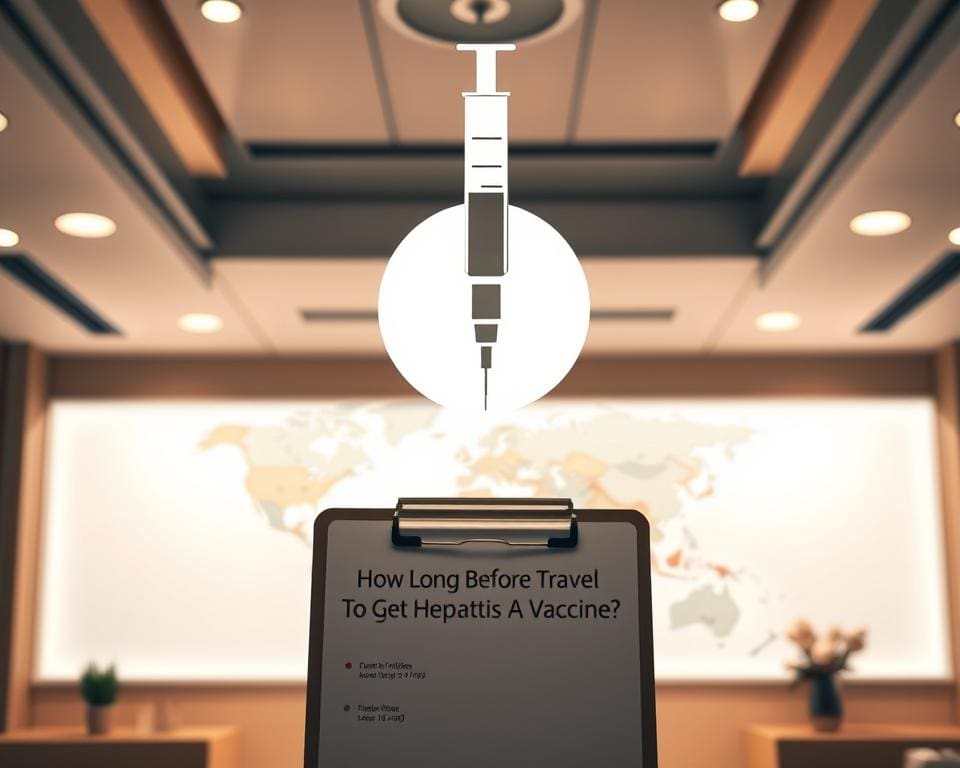Embarking on a journey to new and exciting destinations can be an exhilarating experience. However, securing your health abroad is paramount, especially when it comes to vaccinations. One of the most significant vaccinations to consider is the Hepatitis A vaccine. This viral infection can severely impact your liver and is notably prevalent in areas where sanitation and water quality are compromised. Knowing how long before travel to get the Hepatitis A vaccine is crucial for timely immunisation and ensures that you can explore confidently, free from health concerns. Planning ahead is not just wise; it is a key step in protecting yourself and enjoying a safe travel experience.
Understanding Hepatitis A and Its Risks
Hepatitis A, caused by the Hepatitis A virus (HAV), poses significant concerns for individuals worldwide. This viral infection spreads primarily through the ingestion of contaminated food or water. Symptoms such as fatigue, nausea, abdominal discomfort, and fever can greatly impact one’s daily life.
Travellers should be particularly vigilant, as the risks of Hepatitis A rise dramatically in regions where sanitation standards are inadequate. With a greater number of tourists venturing into these areas, the importance of understanding this health threat cannot be overstated. Awareness of the risks of Hepatitis A allows individuals to take proactive measures to safeguard their travel health.

Preventative actions, including vaccinations and proper hygiene practices, serve as vital steps in combating this viral infection. Although Hepatitis A can be a grave illness, taking the right precautions can significantly diminish the likelihood of contracting this disease while embarking on international adventures.
Importance of Vaccination for Travellers
Vaccination for travellers is essential, especially for those visiting regions where Hepatitis A remains prevalent. The significance of immunisation cannot be overstated, as it offers protection against a severe infection that can disrupt travel plans and impact personal health.
Each person’s health status, along with the specific destination and intended activities, plays a crucial role in determining the need for vaccination. Individuals with pre-existing conditions might experience more severe repercussions if exposed to Hepatitis A. Thus, safeguarding oneself through effective travel health measures, like vaccination, becomes paramount.
A consistent body of evidence highlights that widespread vaccination significantly lowers infection rates in travelling populations. For many, attaining peace of mind during their journeys stems from knowing they are protected from potential health threats. Preparing ahead with the right vaccinations not only enriches the journey but also enhances the overall travel experience.
How Long Before Travel To Get Hepatitis A Vaccine
Preparing for international travel encompasses various health considerations. One critical aspect is understanding the timing for receiving the Hepatitis A vaccine. Proper planning ensures you obtain maximum protection against the virus during your adventures.
Timing Considerations for Vaccination
To achieve optimal protection, you should seek vaccination at least 2 weeks ahead of your departure. This timeframe allows sufficient time for the body to develop immunity. Knowing how long before travel you need to get vaccinated is essential for effective timing. Some individuals may need to prioritise their vaccination schedule based on imminent travel plans.
Doses and Immunity Duration
The Hepatitis A vaccine typically involves an initial dose, which starts to offer protection within weeks. Alongside the first shot, you may need to consider a booster dose later to enhance long-term immunity. Understanding this immunisation duration is crucial for those embarking on extended journeys or frequent travels to high-risk areas. Keep in mind, specific recommendations may vary, making consultations with healthcare professionals invaluable for tailored advice.
Travel Vaccination Schedules
Understanding travel vaccination schedules plays a vital role in ensuring a safe journey. Vaccination age often determines when individuals can receive certain vaccines, including the Hepatitis A vaccine. Countries adhere to various health guidelines to protect their populations and incoming visitors. Given the nature of global travel and differing health environments, specific country guidelines greatly influence the vaccination process.
Recommended Vaccination Age
The World Health Organisation (WHO) encourages vaccinations for children starting from the age of one. Travellers should be aware that the vaccination age may vary based on factors such as local health policies and prevailing health threats. Ensuring that young travellers receive the Hepatitis A vaccine on time can prevent the onset of complications related to this virus.
Specific Country Guidelines
Country-specific guidelines dictate when and how long before travel individuals should acquire their Hepatitis A vaccine. Recommended schedules may fluctuate, especially for destinations with heightened health advisories. Travellers should seek consultation with local health authorities or travel clinics well in advance to ensure compliance with these guidelines.
Hepatitis A Vaccine Timeline
Understanding the Hepatitis A vaccine timeline is crucial for anyone planning to travel. The vaccination process not only lays the groundwork for a healthier journey but also provides peace of mind. It is essential to know when to receive the initial dose and ensure that one is adequately protected against the virus.
Initial Dose Recommendations
The initial dose of the Hepatitis A vaccine typically serves as the first line of defence. This initial dose offers effective short-term protection, lasting from 6 to 12 months. For travellers heading to areas where Hepatitis A is prevalent, obtaining this vaccine well before departure is highly advisable. By scheduling your vaccination ahead of time, you can enjoy your travels with confidence.
Booster Dose Guidelines
To maintain long-term immunity, booster guidelines recommend receiving a second dose of the Hepatitis A vaccine six to twelve months after the initial dose. This is particularly important for those who may frequently return to endemic regions. Adhering to this timeline not only strengthens your immune response but also ensures ongoing protection during your global adventures.
Hepatitis A Shot Before Travel: What You Need to Know
Before embarking on your journey, understanding the potential effects of the Hepatitis A shot can greatly enhance your travel experience. While many individuals tolerate the vaccine well, being aware of possible vaccine side effects is crucial for informed decision-making.
Potential Side Effects
Most people receive the Hepatitis A shot without experiencing any major issues. Yet, some may encounter mild reactions, including:
- Soreness at the injection site
- Low-grade fever
- Headache
These vaccine side effects typically resolve quickly and do not interfere with your travel plans. Staying informed can help alleviate any concerns.
Consulting Your Healthcare Provider
A healthcare provider consultation is advisable before getting vaccinated. During this discussion, you can explore your medical history and any specific travel plans. Your healthcare provider can offer tailored advice, ensuring you are well-prepared and informed regarding the vaccination process. Taking this step can boost your confidence as you set out on your travel adventures.
When to Get Hepatitis A Vaccine Before Travelling
Timing plays a pivotal role in safeguarding your health when planning to explore new destinations. Understanding when to get Hepatitis A vaccine is essential for effective protection against this virus, particularly in areas with varying risk levels. It is vital to align vaccination plans to the nature of the travel, ensuring optimal timing for maximum effectiveness.
Optimal Timing for Different Destinations
The optimal timing varies depending on the risk level associated with your chosen destination. High-risk areas necessitate early vaccination, often several weeks before departure. Leaving enough time allows the vaccine to stimulate your immune system adequately. Conversely, for lower-risk locations, getting vaccinated even a short time before travel may suffice.
Emergency Cases and Last-Minute Travel
Spontaneity can lead to unexpected travel opportunities. In situations of last-minute travel, knowing your vaccination options becomes crucial. While getting the Hepatitis A vaccine shortly before departure may not provide full immunity, it can still offer some degree of protection. Consulting with a healthcare professional remains essential to determine the best course of action under urgent circumstances.
Additional Precautions While Travelling
Even with the protection offered by vaccination, travellers must remain vigilant. Incorporating additional precautions into your travel routine is essential to ensure a safe and healthy experience. Before indulging in local cuisines and exploring new cultures, understanding the basics of hygiene while travelling becomes paramount.
Maintaining Hygiene Abroad
Frequent handwashing is one of the most effective ways to maintain hygiene while travelling. Always wash your hands with soap and water before meals and after using public facilities. If soap is unavailable, carrying hand sanitiser can serve as an excellent alternative. These practices create a barrier against harmful pathogens that may pose a risk, particularly in areas with questionable sanitation standards.
Safe Eating and Drinking Practices
Embracing safe eating is crucial when sampling local dishes. Opt for well-cooked meals and be cautious with street food. Whenever possible, drink bottled or purified water to avoid potential contaminants. This holistic approach to safe eating not only enhances your culinary experience but also significantly reduces the chances of illness during your travels. By focusing on both vaccination and practical safety measures, you can enjoy your journey with confidence and peace of mind.
Health Resources for Travellers
Embarking on a journey requires careful planning, especially when it comes to ensuring your health remains intact. Many health resources for travellers are available to assist in getting the necessary vaccinations before you travel. Understanding where to get vaccinated and identifying trusted health organisations can make your preparations smoother and more reliable.
Where to Get Vaccinated
Travellers have several options for vaccinations. Here are some prominent places where you can seek these essential health services:
- Travel clinics specialising in vaccinations and travel health advice.
- General Practitioner (GP) surgeries, which often provide a range of immunisations.
- Pharmacies that offer vaccination services to the public.
Trusted Health Organisations
Several esteemed health organisations provide invaluable resources for travellers. These institutions offer guidance on vaccinations, health safety protocols, and up-to-date travel health information:
- The National Health Service (NHS) in the UK, providing comprehensive vaccination resources.
- The World Health Organisation (WHO), offering global health standards and vaccination guidelines.
- Public Health England, which advises on health measures and practices for international travel.
Real Life Experiences and Stories
Many travellers share their real-life experiences about receiving the Hepatitis A vaccine prior to embarking on their adventures. One such story involves a group of friends who planned a trip to South America. Concerned about their health precautions, they decided to get vaccinated well in advance. Their testimonial highlights that the peace of mind from being vaccinated allowed them to fully immerse themselves in the local culture without the lingering worry of potential illness.
In another traveller’s account, a solo journey across Southeast Asia unfolded without a hitch, thanks to careful planning that included receiving the Hepatitis A vaccine beforehand. This individual spoke about how the vaccination not only safeguarded their health but also enhanced their overall enjoyment of the trip. By prioritising safety and adhering to health precautions, they experienced diverse cuisines and fabulous locations without fear.
These traveller stories illustrate the distinct benefits of obtaining vaccinations before travel. The resulting confidence in one’s health security can transform a trip from simply being an escape to an opportunity for unforgettable experiences. Inspired by these accounts, many others are now motivated to prioritise their health and embark on their own journeys with a sense of adventure and safety combined.









